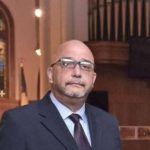Counseling & Telemedicine During COVID-19

 In 2001, SACA began offering drug and alcohol counseling. Like many of our services under a shelter at home order, this has also dramatically changed. Let me introduce Victor Rivera.
In 2001, SACA began offering drug and alcohol counseling. Like many of our services under a shelter at home order, this has also dramatically changed. Let me introduce Victor Rivera.
When you ask Victor why he became a drug and alcohol addiction counselor, he will tell you: “I am grateful to have the opportunity to work with people. I love to help people out.” Mr. Rivera joined the professional staff of SACA as a Counselor in 2017. Victor used to work with his patients face-to-face at the Nuestra Clinica, 545 Pershing Avenue. Now, under Pennsylvania’s shelter-at-home orders, his days are filled with telemed visits with clients battling drug and alcohol addiction.
His path to SACA has not been an easy one. Mr. Rivera will tell you himself: “I am an ex-addict. I was an addict since I was 14 years old. I joined the Army trying to get a better life. However, in the Army I found a different scenario. Things got worse for me with a combination of alcohol and
drugs.” To beat his addiction, Victor admitted himself to an inpatient facility for a year. After successfully completing the program, Victor joined the professional staff of the program as a counselor.
In 2015, Victor moved from Puerto Rico with his wife and family in 2015 for opportunity and a better life. Prior to joining the staff, Victor worked pro bono on the streets of Lancaster counseling addicts. His background makes Victor exceptional at his job because he understands from first-hand experience the life challenges of his patients.
Mr. Rivera talks about the importance of understanding an addicts’ culture. “It is more than just speaking Spanish…I understand the addicts’ Latin culture. It is a challenge to have people change their habits without an understanding of family and culture. Every addict gets started and stays addicted for a different reason. SACA is the only institution in South-central Pennsylvania with full-time professional Spanish speaking counselors, and our services are necessary and in high demand.
“No one was prepared for shelter-at-home,” says Victor, “Some of my clients have managed well, and for some it is a challenge. There are clients that I need to spend more than a normal 55-minute session with. There are other clients that I need to talk to more frequently during the week. And I find that I need to push my clients to open up to me more over the phone than I would need to in person” Like many on the SACA staff Mr. Rivera has risen to the challenge of caring for his patients during the shelter-at-home order. On March 18, SACA launched telemed which allows Victor to work with his patients remotely. As Victor explains, “telemed is a great tool if you know what to do with it.” It is difficult to see a bright side to our current situation, but Victor has found it: “This situation has given us an extra tool to work with our clients. This is especially helpful for working with those clients who have been legally referred to me for addition counseling. Telemed has provided a unique opportunity because our clients are sitting at home, and since there is nowhere else to go, we have their full attention.”
In the program clients have goals. Goals always include learning how to live a clean life, and depending on the individual, goals can include overcoming legal challenges, obtaining an education, or finding a good job. During each session with his clients, Victor discusses these goals: “I tell my clients the biggest mistake they can make is going back to their old lives. Their old lives are the main reason they are in the situation they are in today – emotionally, physically, and psychologically.”
When asked how things will be when the shelter at home order is lifted, Victor commented “I am a person of faith. You have to have faith and in the middle of this situation to sit down, do an inner inspection of yourself and move forward with your family to try to be a better person.” In the meantime, Victor has been passing his free time at home reading, recently completing Grace over the Afflicted: A Clinical and Biblical Perspective on Mental Illnessby Matthew Stanford. The book explains how the word of god resolves itself over the affliction of people suffering.



